Unit 4 The Internet Connects Us Lesson 24 An E-mail to Grandpa课件(共25张PPT,含内嵌视频)冀教版八年级英语下册
文档属性
| 名称 | Unit 4 The Internet Connects Us Lesson 24 An E-mail to Grandpa课件(共25张PPT,含内嵌视频)冀教版八年级英语下册 |

|
|
| 格式 | pptx | ||
| 文件大小 | 24.4MB | ||
| 资源类型 | 教案 | ||
| 版本资源 | 冀教版 | ||
| 科目 | 英语 | ||
| 更新时间 | 2025-04-22 11:33:14 | ||
图片预览

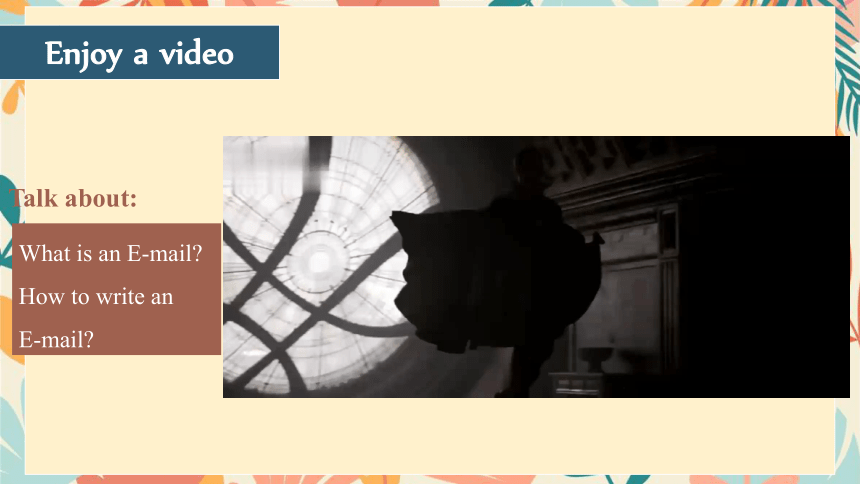
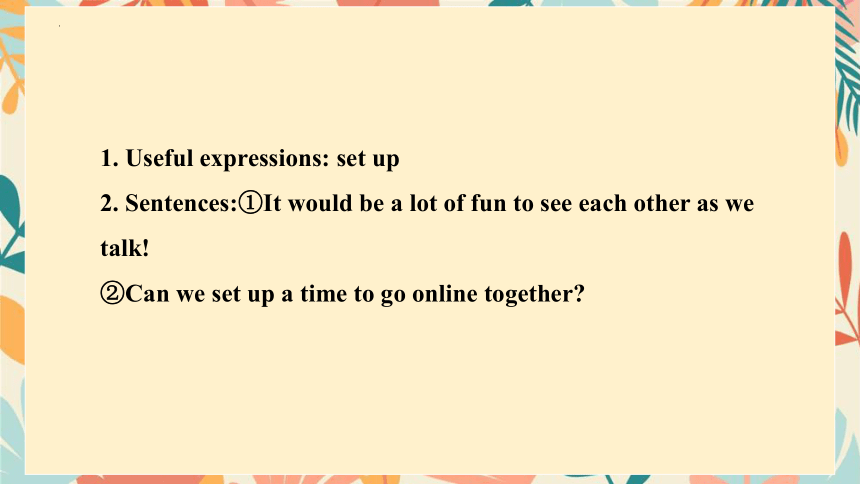
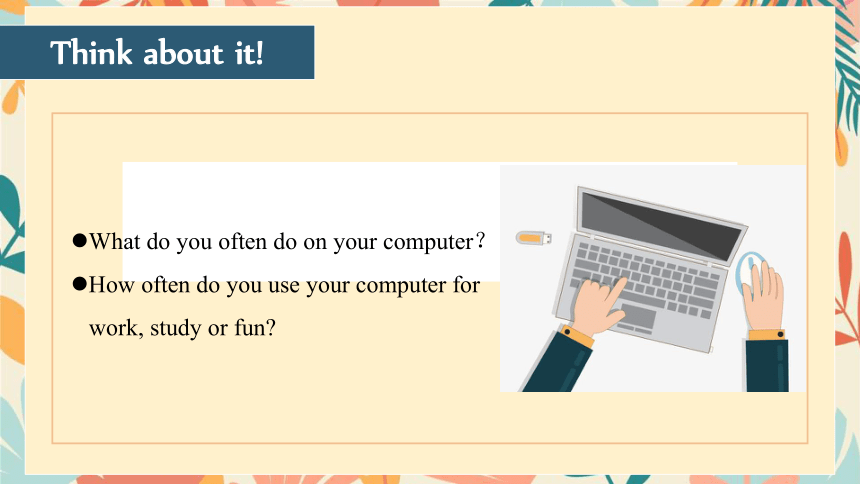

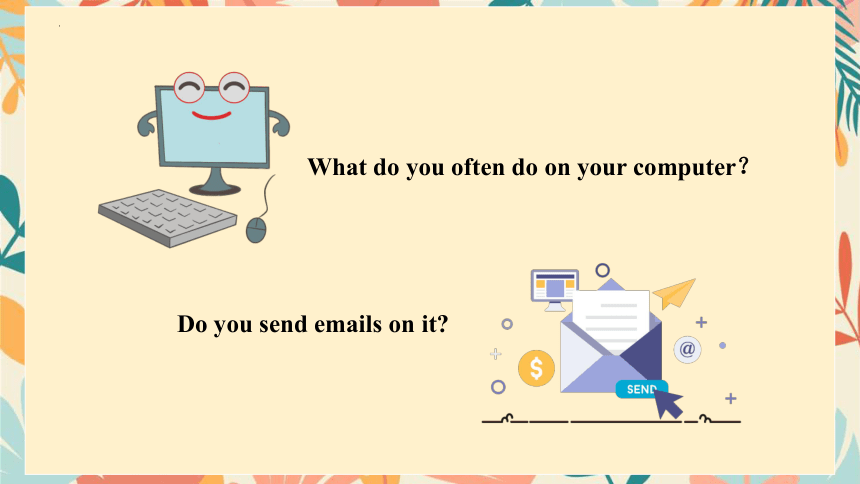
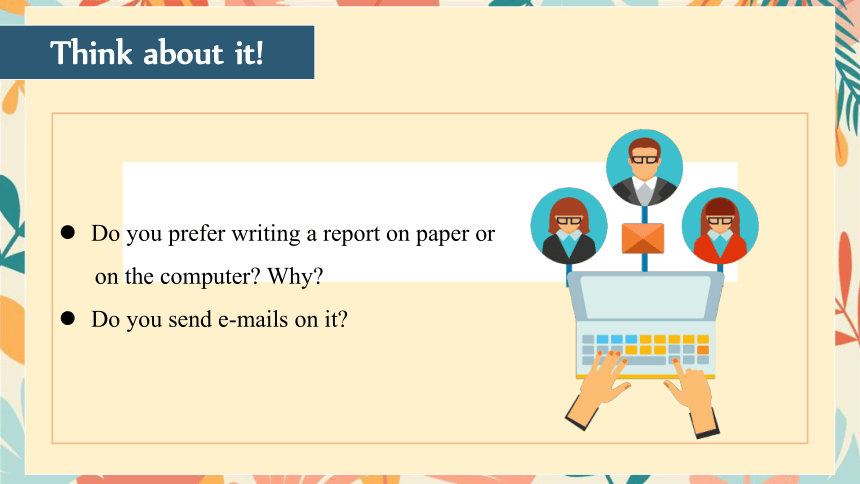
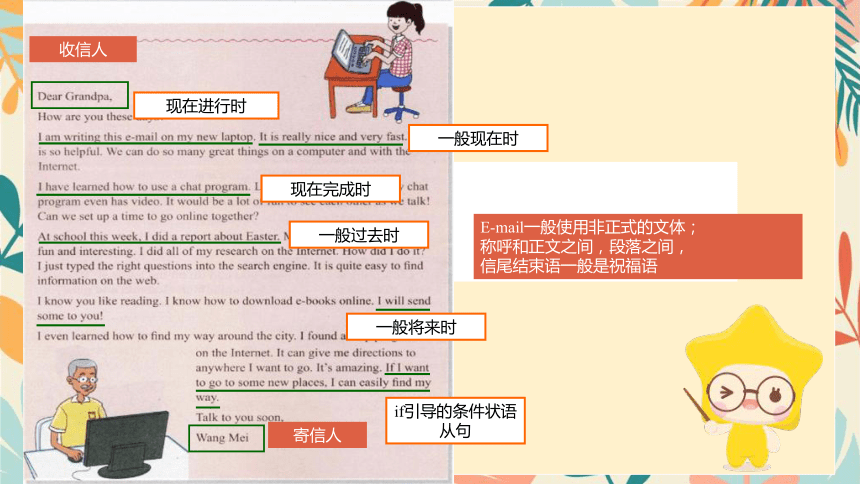
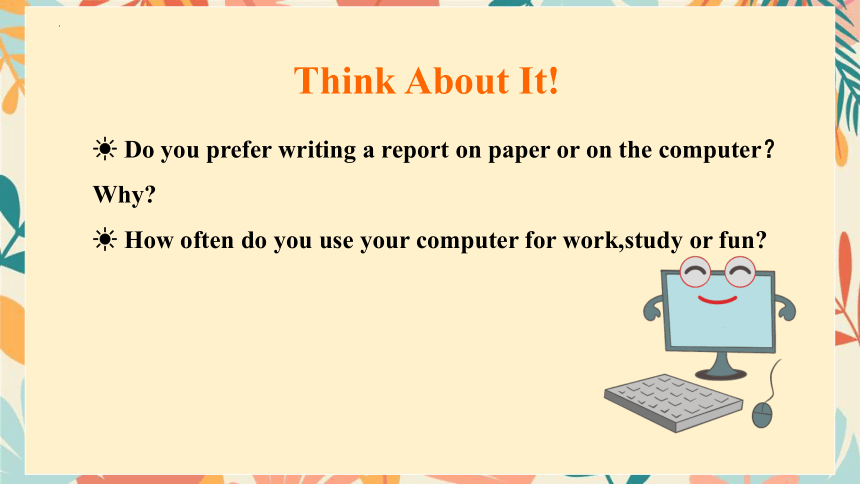
文档简介
(共25张PPT)
Unit 4 The Internet Connects Us
Lesson 24 An E mail to Grandpa
What is an E-mail
How to write an
E-mail
Enjoy a video
Talk about:
1. Useful expressions: set up
2. Sentences:①It would be a lot of fun to see each other as we talk!
②Can we set up a time to go online together
Think about it!
What do you often do on your computer?
How often do you use your computer for
work, study or fun
letter
e-mail
Do you send emails on it
What do you often do on your computer?
Think about it!
Do you prefer writing a report on paper or
on the computer Why
Do you send e-mails on it
收信人
寄信人
E-mail一般使用非正式的文体;
称呼和正文之间,段落之间,
信尾结束语一般是祝福语
现在完成时
一般过去时
一般将来时
一般现在时
if引导的条件状语从句
现在进行时
Think About It!
Do you prefer writing a report on paper or on the computer?Why
How often do you use your computer for work,study or fun
1. What is Wang Mei writing
2. What can she do with the Internet
Reading
Read the lesson and answer the questions.
She can talk with others , do the research, read e-books and
find her way around the city online.
She is writing an e-mail on her new laptop.
It can give me directions to anywhere I want to go.
anywhere作副词,用于肯定句时意为
“随便什么地方”。
Sit anywhere.
I can’t see it anywhere.
辨析:information; news; message; notice
1). information意为“消息;信息”。
包括所有的内容,范畴较广。如:
Can you guess the information from the passage
你能猜出这段文章传达给我们的信息吗?
2). news 是指由他人转告的消息,
可以指很多方面;也可以指新闻。如:
Have you heard the news that there was a war in the small country 你听说了那个小国家战争的新闻吗?
Dear Grandpa,
How are you these days
I am writing this e-mail on my new laptop. It is really nice and very fast. It is so helpful. We can do so many great things on a computer and with the Internet.
Reading
3). message意为“留言”,需要一个中间人传达。如:
There is a message for you.
这儿有一个你的留言。
4). notice意为“通知”。 如:
Do you see the notice that we will have a meeting
this afternoon
你看到我们下午要开会的通知了吗?
Language Points
1.Do you prefer writing a report on paper or on the computer
你更喜欢在纸上还是在电脑上写报告?
prefer v. 更喜欢;宁愿
prefer-preferred-preferred
相比于咖啡,我更喜欢茶。
I prefer tea to coffee.
(2) prefer A to B
相比于B, 更喜欢A
Language Points
1.Do you prefer writing a report on paper or on the computer
你更喜欢在纸上还是在电脑上写报告?
prefer v. 更喜欢;宁愿
prefer-preferred-preferred
相比于喝咖啡,我更喜欢喝茶。
I prefer drinking tea to drinking coffee.
(3) prefer doing A to doing B 更喜欢做A , 跟B相比
THINK ABOUT IT
Do you prefer writing a report on paper or on the computer Why
How often do you use your computer
for work, study or fun
Dear Grandpa,
How are you these days
I am writing this e-mail on my new laptop. It is really nice and very fast. It is so helpful. We can do so many great things on a computer and with the Internet.
网络对工作、生活、娱乐的帮助
search chat program go online set up
Fill in the blanks with the correct forms of the words or phrases.
Let’s Do It!
1. If you spend too much time _______ online, your parents will be angry.
2. I don’t know how to ________ a new computer. Can you help me
3. People began to ________ for the lost kid.
4. When I want to relax, I turn on the radio and listen to my favourite
radio ___________.
5. Li Ming wants to _________ and search the Internet for more
information about Easter.
chatting
set up
search
go online
program(s)
Language points
Language Points
1.他以前更喜欢吃米饭。
He rice.
2.He prefers milk to juice.(译)
和果汁相比,他更喜欢牛奶。
3. 相比于玩电脑游戏,我更喜欢读书。
I prefer _______ books to ______ computer games.
=He _______ ___ ____ rice.
preferred eating
reading
playing
preferred to eat
1. It would be a lot of fun to see each other as we talk!
我们谈话的时候能看到彼此将会很有趣!
as在句中做连词,引导时间状语从句,意为“一边…一边…,随着”
as引导的从句是延续性的,表示主从句同时发生。
e.g. 小女孩边走边唱歌。
The little sang as she walked.
e.g. 随着时间的推移,天气变得更暖和了。
As time went on, the weather got warmer.
Language Points
prefer v. 更喜欢;宁愿
prefer-preferred-preferred
⑴ prefer doing sth. = prefer to do sth. 更喜欢做…
(2) prefer A to B 相比于B, 更喜欢A
prefer doing A to doing B 更喜欢做A , 跟B相比
Language Points
2. I learned how to use a chat program.
我学会了如何使用聊天程序。
=I learned how I could use a chat program.
We don't know where we can go for our holiday.
= We don't know where ___ ___ for our holiday.
to go
宾语从句 可转化为“疑问词+to do”
【拓展】
意为“一边…一边…,随着”,as引导的从句谓动词
必须是延续性的动词,表示主从句动作同时发生
as
意为“当…时候,就在那时”,when引导的从句谓语动词
可以是延续性动词,也可以是瞬间动词。
when
意为“当…时候”,while引导的从句谓动词必须是延续性
的动词,强调主从句同时发生,并且有时表示对比
while
e.g. The students talked as they walked.
e.g. My mother was cooking when I come back.
I had a good time when I stayed here.
e.g. While we were talking, the teach come in.
Can we set up a time to go online together
我们约个时间一起上网好吗?
set-set-set
e.g. 我们应该约个时间开个班会。
We should set up a time to hold a class meeting.
set up a time 约个时间
set up 建立,安装,树立
e.g. They set up a new hospital to help the sick people.
e.g. His father set up a new computer for him.
建立
安装
Unit 4 The Internet Connects Us
Lesson 24 An E mail to Grandpa
What is an E-mail
How to write an
Enjoy a video
Talk about:
1. Useful expressions: set up
2. Sentences:①It would be a lot of fun to see each other as we talk!
②Can we set up a time to go online together
Think about it!
What do you often do on your computer?
How often do you use your computer for
work, study or fun
letter
Do you send emails on it
What do you often do on your computer?
Think about it!
Do you prefer writing a report on paper or
on the computer Why
Do you send e-mails on it
收信人
寄信人
E-mail一般使用非正式的文体;
称呼和正文之间,段落之间,
信尾结束语一般是祝福语
现在完成时
一般过去时
一般将来时
一般现在时
if引导的条件状语从句
现在进行时
Think About It!
Do you prefer writing a report on paper or on the computer?Why
How often do you use your computer for work,study or fun
1. What is Wang Mei writing
2. What can she do with the Internet
Reading
Read the lesson and answer the questions.
She can talk with others , do the research, read e-books and
find her way around the city online.
She is writing an e-mail on her new laptop.
It can give me directions to anywhere I want to go.
anywhere作副词,用于肯定句时意为
“随便什么地方”。
Sit anywhere.
I can’t see it anywhere.
辨析:information; news; message; notice
1). information意为“消息;信息”。
包括所有的内容,范畴较广。如:
Can you guess the information from the passage
你能猜出这段文章传达给我们的信息吗?
2). news 是指由他人转告的消息,
可以指很多方面;也可以指新闻。如:
Have you heard the news that there was a war in the small country 你听说了那个小国家战争的新闻吗?
Dear Grandpa,
How are you these days
I am writing this e-mail on my new laptop. It is really nice and very fast. It is so helpful. We can do so many great things on a computer and with the Internet.
Reading
3). message意为“留言”,需要一个中间人传达。如:
There is a message for you.
这儿有一个你的留言。
4). notice意为“通知”。 如:
Do you see the notice that we will have a meeting
this afternoon
你看到我们下午要开会的通知了吗?
Language Points
1.Do you prefer writing a report on paper or on the computer
你更喜欢在纸上还是在电脑上写报告?
prefer v. 更喜欢;宁愿
prefer-preferred-preferred
相比于咖啡,我更喜欢茶。
I prefer tea to coffee.
(2) prefer A to B
相比于B, 更喜欢A
Language Points
1.Do you prefer writing a report on paper or on the computer
你更喜欢在纸上还是在电脑上写报告?
prefer v. 更喜欢;宁愿
prefer-preferred-preferred
相比于喝咖啡,我更喜欢喝茶。
I prefer drinking tea to drinking coffee.
(3) prefer doing A to doing B 更喜欢做A , 跟B相比
THINK ABOUT IT
Do you prefer writing a report on paper or on the computer Why
How often do you use your computer
for work, study or fun
Dear Grandpa,
How are you these days
I am writing this e-mail on my new laptop. It is really nice and very fast. It is so helpful. We can do so many great things on a computer and with the Internet.
网络对工作、生活、娱乐的帮助
search chat program go online set up
Fill in the blanks with the correct forms of the words or phrases.
Let’s Do It!
1. If you spend too much time _______ online, your parents will be angry.
2. I don’t know how to ________ a new computer. Can you help me
3. People began to ________ for the lost kid.
4. When I want to relax, I turn on the radio and listen to my favourite
radio ___________.
5. Li Ming wants to _________ and search the Internet for more
information about Easter.
chatting
set up
search
go online
program(s)
Language points
Language Points
1.他以前更喜欢吃米饭。
He rice.
2.He prefers milk to juice.(译)
和果汁相比,他更喜欢牛奶。
3. 相比于玩电脑游戏,我更喜欢读书。
I prefer _______ books to ______ computer games.
=He _______ ___ ____ rice.
preferred eating
reading
playing
preferred to eat
1. It would be a lot of fun to see each other as we talk!
我们谈话的时候能看到彼此将会很有趣!
as在句中做连词,引导时间状语从句,意为“一边…一边…,随着”
as引导的从句是延续性的,表示主从句同时发生。
e.g. 小女孩边走边唱歌。
The little sang as she walked.
e.g. 随着时间的推移,天气变得更暖和了。
As time went on, the weather got warmer.
Language Points
prefer v. 更喜欢;宁愿
prefer-preferred-preferred
⑴ prefer doing sth. = prefer to do sth. 更喜欢做…
(2) prefer A to B 相比于B, 更喜欢A
prefer doing A to doing B 更喜欢做A , 跟B相比
Language Points
2. I learned how to use a chat program.
我学会了如何使用聊天程序。
=I learned how I could use a chat program.
We don't know where we can go for our holiday.
= We don't know where ___ ___ for our holiday.
to go
宾语从句 可转化为“疑问词+to do”
【拓展】
意为“一边…一边…,随着”,as引导的从句谓动词
必须是延续性的动词,表示主从句动作同时发生
as
意为“当…时候,就在那时”,when引导的从句谓语动词
可以是延续性动词,也可以是瞬间动词。
when
意为“当…时候”,while引导的从句谓动词必须是延续性
的动词,强调主从句同时发生,并且有时表示对比
while
e.g. The students talked as they walked.
e.g. My mother was cooking when I come back.
I had a good time when I stayed here.
e.g. While we were talking, the teach come in.
Can we set up a time to go online together
我们约个时间一起上网好吗?
set-set-set
e.g. 我们应该约个时间开个班会。
We should set up a time to hold a class meeting.
set up a time 约个时间
set up 建立,安装,树立
e.g. They set up a new hospital to help the sick people.
e.g. His father set up a new computer for him.
建立
安装
同课章节目录
- Unit 1 Spring Is Coming
- Lesson 1 How's the weather?
- Lesson 2 It's Getting Warmer!
- Lesson 3 Sun Is Rising
- Lesson 4 The Spring City
- Lesson 5 Babysitting on a Spring Day
- Lesson 6 Stories about Spring
- Unit 2 Plant a Plant
- Lesson 7 Planting Trees
- Lesson 8 Why Are Plants Important?
- Lesson 9 Gardening with Mary
- Lesson 10 Make Your Garden Grow!
- Lesson 11 Amazing Plants
- Lesson 12 Danny's Plant
- Unit 3 Animals Are Our Friends
- Lesson 13 Danny's Big Scare
- Lesson 14 Amazing Animals
- Lesson 15 The Zoo Is Open
- Lesson 16 The Pear Escaped
- Lesson 17 Save the Tigers
- Lesson 18 Friendship Between Animals
- Unit 4 The Internet Connects Us
- Lesson 19 How Do You Use the Internet?
- Lesson 20 A Computer Helps!
- Lesson 21 Books or Computers?
- Lesson 22 Travel on the Internet
- Lesson 23 The Internet--Good or Bad?
- Lesson 24 An E-mail to Grandpa
- Unit 5 Buying and Selling
- Lesson 25 Raising Money
- Lesson 26 Cookies, Please!
- Lesson 27 Business English
- Lesson 28 Ms. Liu's Great Idea
- Lesson 29 How to Push a Product
- Lesson 30 A Cookie Sale
- Unit 6 Be a Champion!
- Lesson 31 Don't Fall, Danny
- Lesson 32 My Favourite Record
- Lesson 33 2800 Years of Sports
- Lesson 34 Modern Olympics
- Lesson 35 The Dream Team
- Lesson 36 Classroom Olympics
- Unit 7 Know Our World
- Lesson 37 Let's Learn Geography!
- Lesson 38 The World Is a Big Place
- Lesson 39 Ring Up or Call?
- Lesson 40 Body Language
- Lesson 41 A Class of the World
- Lesson 42 North America
- Unit 8 Save Our World
- Lesson 43 Let's Clean Up!
- Lesson 44 Environment Clubs
- Lesson 45 Let's Sort Garbage!
- Lesson 46 Protect Our Environment
- Lesson 47 Connected to Nature
- Lesson 48 Garbage Is Interesting!
